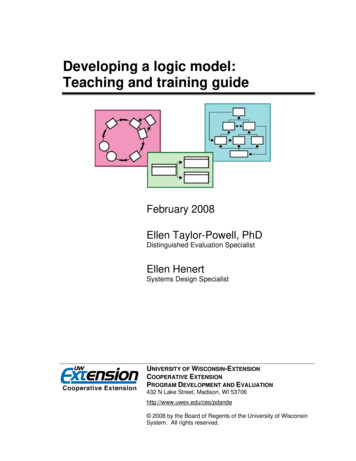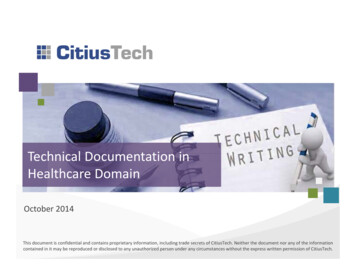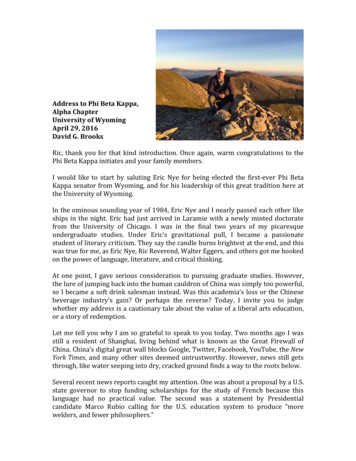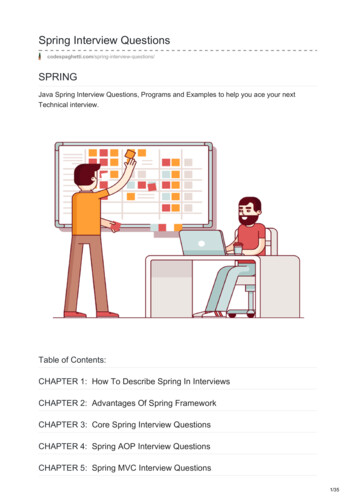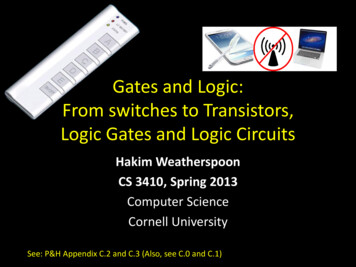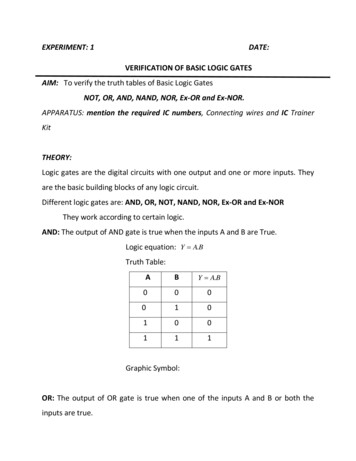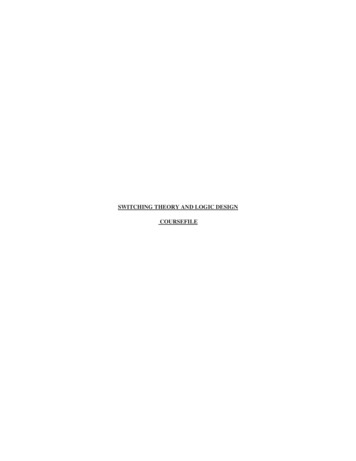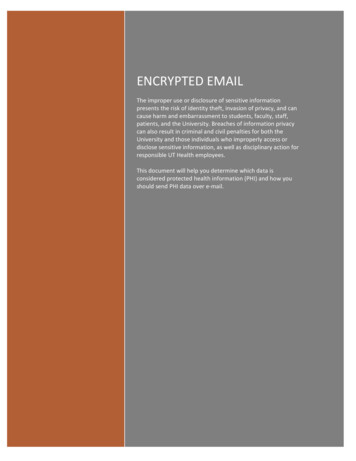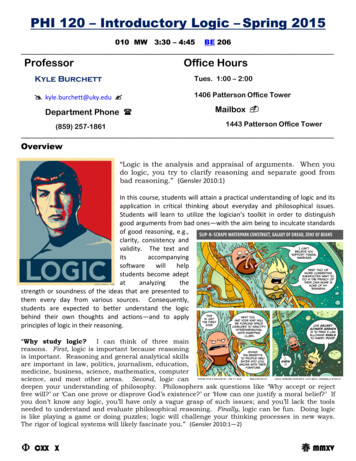
Transcription
PHI 120 – Introductory Logic – Spring 2015010 MW 3:30 – 4:45 BE 206ProfessorOffice HoursKyle BurchettTues. 1:00 – 2:00 kyle.burchett@uky.edu 1406 Patterson Office TowerDepartment Phone Mailbox 1443 Patterson Office Tower(859) 257-1861Overview“Logic is the analysis and appraisal of arguments. When youdo logic, you try to clarify reasoning and separate good frombad reasoning.” (Gensler 2010:1)In this course, students will attain a practical understanding of logic and itsapplication in critical thinking about everyday and philosophical issues.Students will learn to utilize the logician’s toolkit in order to distinguishgood arguments from bad ones—with the aim being to inculcate standardsof good reasoning, e.g.,clarity, consistency andvalidity. The text anditsaccompanyingsoftwarewillhelpstudents become adeptatanalyzingthestrength or soundness of the ideas that are presented tothem every day from various sources. Consequently,students are expected to better understand the logicbehind their own thoughts and actions—and to applyprinciples of logic in their reasoning.“Why study logic?I can think of three mainreasons. First, logic is important because reasoningis important. Reasoning and general analytical skillsare important in law, politics, journalism, education,medicine, business, science, mathematics, computerscience, and most other areas. Second, logic candeepen your understanding of philosophy. Philosophers ask questions like ‘Why accept or rejectfree will?’ or ‘Can one prove or disprove God’s existence?’ or ‘How can one justify a moral belief?’ Ifyou don’t know any logic, you’ll have only a vague grasp of such issues; and you’ll lack the toolsneeded to understand and evaluate philosophical reasoning. Finally, logic can be fun. Doing logicis like playing a game or doing puzzles; logic will challenge your thinking processes in new ways.The rigor of logical systems will likely fascinate you.” (Gensler 2010:1—2) CXX X春 MMXV
2Required TextIntroduction to LogicRoutledge, 2nd Edition, 2010Harry J. GenslerISBN: 0415996511"Students are given a first-rate, accessible introduction tothe fundamentals of logic through extensive examples fromsome of the great questions in the history of philosophy.Thus, students are learning philosophy even as they'redoing logic.The free program accompanying the text, with its gameformat, is a genuine tutorial that enables students tomaster the concepts of each section through new examplesand instant feedback."Jay Aultman-Moore, Waynesburg University“As you work through this book, you’ll examine reasoning onvarious topics, both philosophical (like free will and determinism,the existence of God, and the nature of morality) and nonphilosophical (like backpacking, water pollution, football,Supreme Court decisions, and the Bible). You’ll come to seelogic not as an irrelevant game with funny symbols, but as auseful tool to clarify and evaluate our reasoning – whether onlife’s deeper questions or on everyday topics.” (Gensler, p. 1) CXX X春 MMXV
3GradingStudents will maximize the possibility of receiving a satisfactory grade in this course by completing all assignments andattending every class ready to discuss that day’s material. It is each student’s responsibility to request make-up quizzesor exams, although there will be no make-ups without an excused absence.The grading scale is as follows: A 90 – 100%, B 80 – 89%, C 70 – 79%, D 60 – 69%, E 0 – 59%.1. Quizzes: (50%) There will be a number of quizzes administered throughout the semester – announced andunannounced. Quizzes will test students’ comprehension of material and ability to solve problems from homeworkassignments. The number of quizzes given will determine the percentage each quiz is worth. The lowest quiz gradewill be dropped. Missed quizzes cannot be made up without an excused absence.2. Exams: (50%) There will be two exams, a midterm and a final, each worth 25%. Exams will test students’comprehension of material and ability to apply logic to solve the sorts of problems encountered in the homeworkassignments. Missed exams cannot be made up without an excused absence.3. Attendance/Participation: Attendance is mandatory. Students will be permitted two unexcused absences, althoughperfect attendance is highly recommended. Each subsequent unexcused absence will result in a deduction of twopercentage points from the final grade. Please note that students will be counted absent if they are tardy, leaveearly without permission, fail to pay attention, or are otherwise disruptive. If you are going to be absent and have alegitimate reason, it is in your best interest to let me know.4. Extra Credit: Students who maintain perfect attendance and consistently contribute to classroom discussions willbe awarded up to five bonus percentage points at the end of the semester. Students may also have opportunitiesto receive points by participating in outside events announced by the instructor.Letters of AccommodationIf you have a documented disability which requires academic accommodations, please contact me as soon as possiblewith a letter of accommodation from the Disability Resource yResourceCenter/current.html.Miscellaneous Be Advised: A Text messaging or listening to headphones is strictly forbidden and will result in a deduction of twopercentage points from the GPA for each offense. Cell phones must be muted or turned off during class. ‘Smart’devices are allowed only if used for taking notes or accessing assigned materials. Appointments are not necessary. If you would prefer to privately discuss the materials or anything else, please donot hesitate to visit me during my scheduled office hours or contact me by e-mail. CXX X春 MMXV
4Assignment Schedule*1. W 1.14Greetings—What We Are Doing in This Class2. M 1.19Academic Holiday3. W 1.21 Introduction, Fallacies and ArgumentationRead all of Ch. 1, Skip ahead to Ch. 4: Good Arguments (Ch. 1, Ch. 4.1) pp. 1—6, 55—59Informal Fallacies, Exercise (Ch. 4.2, 4.2a) pp. 59—674. M 1.26 Fallacies and ArgumentationAnother Fallacy Exercise, Inconsistency, Exercise (Ch. 4.2b, 4.3, 4.3a) pp. 67—735. W 1.28 Fallacies and ArgumentationConstructing Arguments, Exercise, Analyzing Arguments (Ch. 4.4, 4.4a, 4.5) pp. 74—796. M 2.01 Inductive ReasoningThe Statistical Syllogism, Probability Calculations, Exercise (Ch. 5.1, 5.2, 5.2a) pp. 80—877. W 2.04 Inductive ReasoningPhilosophical Questions, Exercise (Ch. 5.3, 5.3a) pp. 87—928. M 2.09 Inductive ReasoningReasoning from a Sample, Exercise (Ch. 5.4, 5.4a) pp. 92—959. W 2.11 Inductive ReasoningAnalogical Reasoning, Exercise, Analogy and Other Minds (Ch. 5.5, 5.5a, 5.6) pp. 95—9910. M 2.16 Inductive ReasoningMill’s Methods, Exercise (Ch. 5.7, 5.7a) pp. 99—10411. W 2.18 Inductive ReasoningBest Explanation Reasoning, Problems with Induction (Ch. 5.9, 5.10) pp. 111—11712. M 2.23 Basic Propositional LogicEasier Translations, Exercise (Ch. 6.1, 6.1a) pp. 118—12113. W 2.25 Basic Propositional LogicSimple Truth Tables, Exercise (Ch. 6.2, 6.2a) pp. 121—12414. M 3.02Review for Midterm Exam15. W 3.04Midterm Exam†16. M 3.09 Basic Propositional LogicTruth Evaluations, Exercise, Unknown Evaluations, Exercise (Ch. 6.3, 6.3a, 6.4, 6.4a) pp. 124—12617. W 3.11 Basic Propositional LogicComplex Truth Tables, Exercise, The Truth-Table Test, Exercise (Ch. 6.5, 6.5a, 6.6, 6.6a) pp. 126—13218. M 3.16Spring Break*†To be revised at the instructor’s discretion.Midterm grades will be posted on myUK by midnight Friday, 3.13. CXX X春 MMXV
519. W 3.18Spring Break20. M 3.23 Basic Propositional LogicThe Truth-Assignment Test, Exercise, Exercise (Ch. 6.7, 6.7a, 6.7b) pp. 133—13821. W 3.25 Basic Propositional LogicHarder Translations, Exercise (Ch. 6.8, 6.8a) pp. 138—14022. M 3.30 Basic Propositional LogicIdiomatic Arguments, Exercise (Ch. 6.9, 6.9a) pp. 140—14323. W 4.01 Basic Propositional LogicS-Rules, Exercise (Ch. 6.10, 6.10a) pp. 143—14624. M 4.06 Basic Propositional LogicI-Rules, Exercise, Mixing S- and I-Rules, Exercise (Ch. 6.11, 6.11a, 6.12, 6.12a) pp. 146—15025. W 4.08‡ Basic Propositional LogicExtended Inferences, Exercise (Ch. 6.13, 6.13a) pp. 150—15226. M 4.13 Propositional ProofsEasier Proofs, Exercise (Ch. 7.1, 7.1a) pp. 153—15727. W 4.15 Propositional ProofsExercise (Ch. 7.1b) pp. 157—16028. M 4.20 Propositional ProofsEasier Refutations, Exercise (Ch. 7.2, 7.2a) pp. 160—16329. W 4.22 Propositional ProofsExercise (Ch. 7.2b) pp. 163—16730. M 4.27Review for Final Exam§31. W 4.29Review for Final Exam32. M 5.04FINAL EXAM [3:30 p.m. – 5:30 p.m.] BE 206Final grades will be posted on myUK by midnight Monday, 5.11.‡thThe last day to withdraw from the university or reduce course load is Friday, April 10 .§Any student with more than two final examinations scheduled on any one date shall be entitled to have the examination for theclass with the highest catalog number rescheduled. In case this highest number is shared by more than one course, the one whose departmental prefix is first alphabeticallywill be rescheduled. The option to reschedule must be exercised in writing to the appropriate instructor two weeks prior to the scheduledexamination. CXX X春 MMXV
“Logic is the analysis and appraisal of arguments. When you do logic, you try to clarify reasoning and separate good from bad reasoning.” (Gensler 2010:1) In this course, students will attain a practical understanding of logic and its application in c
